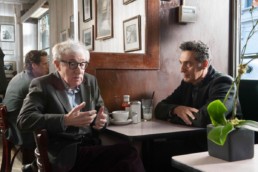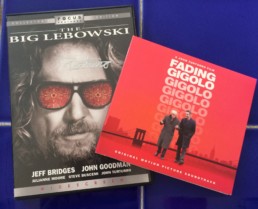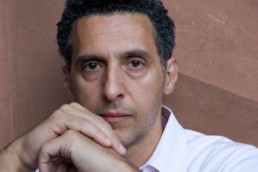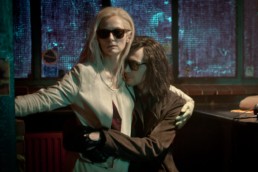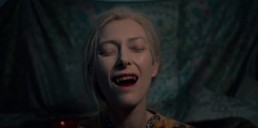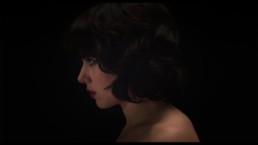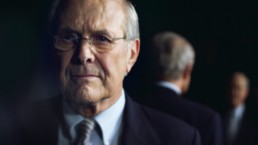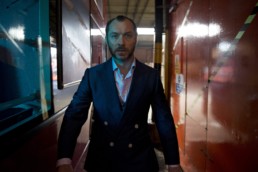Review: 'Fading Gigolo'
For a film about prostitution, writer/director John Turturro's latest sure is a touching, warm-hearted, good-natured film that earns its emotional and comedic beats. Fading Gigolo, in which the director stars himself as single and middle-aged Fioravante, a flower store worker turned private escort, has a palpable heartbeat to it, and becomes a film that one can intimately connect with.
What we have then, is an adult comedy about the woes of sex and love and death at middle age, through the story of a personal bedder. Turturro's restraint and subtlety in his character make Fioravante, seen at the beginning of the film defeatedly closing his bookstore and in search of cash, a man to instantly sympathize with. Which helps, because it's practically the next scene when Fioravante is proposed to become nightly company for an entire sub-culture of romantically interested middle-aged women by his old friend, Murray, played by Woody Allen. With that information alone you can probably already guess what that back and forth buddy pal dynamic would be, and why it makes the premise funnier, when Woody Allen the comedian is on hand to orchestrate the pimping business (whether that is true for Woody Allen the person, I'm not sure).
Fading Gigolo is an emotionally warm and comedically smart film that would certainly please fans of adult-skewing romantic comedies.
Woody as Murray is a joy to watch in his return to the big screen, a more rare event in which he acts in another director's film as seen here. And if you get the feeling that the whole show might even start to feel like it could be of Allen's own more serious adult comedies, you wouldn't be half-wrong, as Allen offered Turturro early script notes. In fact, Turturro's original vision was that the film play as a broader, more bawdy comedy. But when Woody Allen heard of the story from their shared barber, he was brought onboard, offering "brutal notes," which gives the film an entirely new, yet much more romantically charged and perhaps more honest DNA.
Director of photography Marco Pontecorvo also shoots Gigolo beautifully, casting a warm spell over the red tree'd New York neighborhoods. This romantic charge dresses up the whole event and makes for a rich place for the characters to explore their existential crises' of human existence in. In all actuality, the themes that are handled and explored here stem from very real, very grounded and honest, life experiences. Fioravante's navigation through the film introduces us to characters seeking love and connection in middle age, including his first client, married but neglected Dr. Parker (Sharon Stone), the sexy bombshell Selima (Sofía Vergara) and Avigal (a wonderful Vanessa Paradis), a lonely single Hasidic spouse, of whom, Fioravante develops a romantic interest for.
Fading Gigolo is an emotionally warm and comedically smart film that would certainly please fans of adult-skewing romantic comedies. Turturro's coloring and crafting of sophistication are a welcomed treat that could even offer you a little more than entertainment.
https://www.youtube.com/watch?v=DuKoub-Sy9k
Contest: 'Fading Gigolo' Prize Pack
Congratulations to our FADING GIGOLO prize pack winner, Jasper Bernbaum! That DVD is really gonna tie the room together. Check your email for details!
You've seen him in a number of celebrated American indie movies, and now you can own a piece of that cinematic history. As writer/director John Turturro sets to release his latest feature film, Fading Gigolo, CINEMACY is offering you the chance to win a Fading Gigolo prize pack that includes a signed copy of one of Turturro's most beloved movies, The Big Lebowski, along with the Fading Gigolo original soundtrack! The Big Lebowski DVD, in which Turturro steals the show as the manic bowler Jesus, who "Nobody f***s with," is autographed by the actor, making for an incredible prize to entice movie fans of all kinds.
Here's how to enter:
In the comments section, answer the following question:
What is your favorite John Turturro character/movie, and why?
And as always, like CINEMACY on Facebook, and follow us on Twitter and Instagram for the latest news!
Contest ends Friday, April 18th, 2014 at 5:59 p.m. Good luck!
Synopsis: Fioravante (John Turturro) decides to become a professional Don Juan as a way of making money to help his cash-strapped friend, Murray (Woody Allen). With Murray acting as his "manager", the duo quickly finds themselves caught up in the crosscurrents of love and money.
Running time: 98 minutes
Rated: R
In theaters: Friday, April 18th, 2014.
OFFICIAL RULES
NO PURCHASE NECESSARY TO ENTER OR WIN: FADING GIGOLO Prize Package Giveaway. Contest is open to legal residents of the 50 U.S. states and Canada, age 18 or older at time of entry. Void outside the US and Canada where prohibited by law. Sweepstakes begins at 12:00 p.m. Pacific Standard Time (“PST”) on 4/14/2014 and ends at 5:59 p.m. (“PST”) on 4/18/2014. All entries must be made via the comments section on this page. Winners must respond with their mailing address within 72 hours of being notified or an alternate winner will be selected. All federal, state and local regulations apply.
John Turturro talks Woody Allen, Beauty, and Sex in 'Fading Gigolo'
Perhaps better known for his more accomplished performances in celebrated American indies (Barton Fink, The Big Lebowski), John Turturro has also made a career out of stepping behind the camera to direct. In this writer/director effort, Fading Gigolo, Turturro teams up with Woody Allen, whose acting in another director's works marks a rare event, as the pair team up here as a paid lover and his bumbly and neurotic "manager." Though if creepy thoughts start to rise in your mind at this point, I would assure you, this adult romantic comedy sidesteps any uncomfortable and awkward comedy, creating instead an intimate and heartfelt look about companionship, loneliness, and love, in the second half of our lives. Turturro, shaking everyone's hands at a roundtable interview before we started, effortlessly displayed class and charm, as
WHAT'S FASCINATING ABOUT THIS MOVIE IS THAT, IN BLACK AND WHITE, IT'S ABOUT PROSTITUTION. BUT YOU PORTRAY IT IN AN ENTIRELY DIFFERENT LIGHT, AND ACTUALLY FEELS LIKE YOUR CHARACTER, FIORAVANTE, IS REALLY HELPING THESE PEOPLE?
I mean, I kind of used the prostitution angle, and even the religious angle as a metaphor, because, why do people do those things? Why have people paid for sex for such a long time?, you know, it's been one of the oldest "jobs," in a way. A lot of actresses in the theater, in like the 1700's, 1800's- first of all, they weren't actresses, they were courtesans. Sarah Bernhardt was a courtesan. As a matter of fact, the intermissions were so long in the theater because sometimes people would see someone on stage, and then they'd have like, an encounter during the intermission. So, actors were not allowed to be buried, because they were considered the same thing, cause they were performers.
So I've always been interested in it, there's always been some fascinating films over the years, foreign films, American films, iconic performances from like Barbara Stanwyck, to Joan Crawford, to Elizabeth Taylor, to Nights of Cabiria, which is one of my favorite movies, something that interests me. I like Midnight Cowboy, obviously. So when I met with Woody, Woody and I were talking, and he and I thought we could be good together and I thought, "Wow, if we were in the sex business, that would be really interesting."
[Laughter]
And Woody was like, "Yeah, this could be perfect for us." I thought, "maybe we'd be good together, maybe we were getting into the business or getting out of it because of circumstances, but maybe it would be an unlikely pair. And then I started thinking about you know, if the guy, I have friends who are around my age, or younger or older, they still live by themselves, and they're alone. They're like a samurai type of existence, and I thought, well that would be interesting, especially if it's a guy who's very comfortable with women, who likes women. Cause there are lots of men who are even married, or whatever, but they don't really like women. They're not very comfortable working with them, or socializing with them. They're more of a guy's guy. And I thought, that's something, I'm comfortable with that situation, maybe because of my relationship with mother or with my wife, or the woman whose costume designs are in the film, we shared a workspace for years, you know we're really close friends, I have a lot of women close friends. And I thought well that could be interesting. And I also liked the idea of a guy who was a physical person, who could do things physically, you know, take something apart, take an engine apart, make a meal, work in a flower store, and he wasn't a salesman. So he was an unambitious person, which you don't see a lot of times in a movie. But very competent person, but lonely. And then, interacting with all of these women who are lonely for different reasons. And I thought, well that could be interesting.
And also the idea of beauty, of what people associate with being beautiful versus being sexy. And sexuality comes in all sizes and shapes, and hairdos and colors and whatever it is, but I thought, that's interesting, because sometimes you meet someone and they're not really at all beautiful, but they're very attractive, in some way. And I thought wow, that's interesting to explore if we light it right, and control the palette, an we make it palpable, like a rich painting is, or a rich photograph. And then you can feel, you can enter into this photograph, or this novella...I used a lot of Saul Leiter photographs, he was a fashion photographer, but he took these street photographs in the thirties and forties, interestingly enough he came from a Hasidic family, or an Orthodox family, but he processed it in this special dye-transfer, they're beautiful photographs of people's reflections in mirrors, anonymous people. That and I took the Italian still-life painter Mirandi, who does all these beautiful still lives, and I used that as kind of a color scheme and I thought, you want to go into this special world, like all the stripes, with the Hasidic community, which is true, it's echoed in Fioravante's character. So I tried to use things from real life, I did a lot of research with the streetwalking aspect, and also with the Hasidic, because I thought I needed one religion, either Muslim, or Catholic, usually its always about a nun.
Woody and I were talking, and he and I thought we could be good together and I thought, "Wow, if we were in the sex business, that would be really interesting."
But the whole idea of head covering, I really find fascinating. And I think when someone's head is covered, you know, there's this whole fear that if the woman's head is uncovered, she's going to run rampant, and it pervades through a lot of this world, today. And even in cultures that don't have that as much, maybe it's a different kind of culture, but there's a fear, that a woman being too free, or something. So I thought, wow, that would be really strong, if she's kind of a metaphor, for that. And in the course of that crazy idea, these two people meet and something occurs between them that is really big. Because, whatever age she (Avigal) is, she has six kids, but its like she's still eighteen years old, she's never been courted, she's never been looked at, she's never kind of opened up and said, "This is who I am," and someone saying "Wow, you're a fantastic person," she just was given. And it's a big part of life. And even Sharon's (Stone) character, she's kind of imprisoned in her rich world, but in a different way. Sofia's (Vergara) not, but you want to have a balance. So these are things that interested me, I'm interested in relationships, but the idea of how everyone can be lonely, even in you're in a relationship, sometimes people go outside of it for adventure or something else, and how that's an unceasing need throughout life, whatever age you are, you're this age now, but you could be seventy years from now, you could've lost someone, or whatever and you have to reinvent yourself, and you're still looking for someone to connect with, or to be in the dark with. That idea of two feet in the dark, that never stops. That's part of our life, you know, besides warmth and safety and food, it's a big part of our lives. And so I wanted to put this into an entertaining movie. And Woody encouraged me to really delve deeper, cause originally my idea was very broad and crazy- I had a lot of great ideas, but they weren't working in conjunction with one another.
WHAT WAS THE ORIGINAL IDEA FOR THE FILM?
Well the original idea was more like they were trying to get out, it was a little broader and more bawdy, and stuff like that. But one of the first original ideas, which I loved, that I held onto for a long time, was, and which I regretted never being able, but I just didn't have room for it, was, I had a character, because I knew Elaine Stritch, I worked on a play with her and I also directed her in Romance & Cigarettes, and she went to Catholic school. And I knew I wanted religion, cause I like anything about religion, because you can't have sex without religion...
[Laughter]
HOW MUCH OF YOURSELF IS IN YOUR CHARACTER?
Well you always use aspects of yourself, but there were aspects of other people that I drew on. And that's it, that's what you're doing in lots of characters when you're doing it. But certainly, feeling comfortable with women, I'm not an isolated person, and I'm not probably good as physically as he is, I'm good at certain things. But like I worked in that flower shop for like a week with all the ladies, and it was wonderful. It was like kind of heaven for me. I mean it was hard work, but I was learning how to make beautiful arrangements, re-pot orchids...so I've always liked when I've had female directors or female coaches, I've always felt more comfortable with that. Not that there isn't some people I haven't gotten along with. But that's the trick of it, you have to make something personal and also imaginative. I used to make up notebooks, like what I had in common with the character and what I didn't, and what I needed to work on. But there's a lot of me in the film across the board, not just in that person.
HOW DID YOU WORK WITH WOODY ALLEN ON THIS? I UNDERSTAND THAT IN THE DEVELOPMENT STAGES HE WOULD GIVE YOU NOTES...
He gave me brutal notes about things that he didn't think were believable, and then I would think about it, and he'd say, "I like this part, think about this, think about that," and I kept coming back. He said I could withstand his brutality, his brutal criticism. But he liked me enough, and I liked him enough to think about what he said. Someone else I would've said, "Forget it, I'm gonna go somewhere else." But I thought, this is an interesting situation, and in life, you always, once again, the idea of reinventing myself, you're always learning. You know, I'm still learning too. So maybe I could learn something from him. And I think he really admired that, and that's why he asked me to direct these plays in the middle of it, and then once we really got to know each other, you now, he's alive. So if you're too afraid, you can be respectful, but if you're too afraid, you can't really do anything. And he always liked the way I had written his character, that he always liked, but his voice is in my head. I have enough material that I could easily do a sequel.
Review: 'Only Lovers Left Alive'
It may seem like a while ago, but vampires used to be all the rage in pop culture moviedom. Though the Bellas and Edwards have had their (sparkly) moments in the sun, like a wildly forceful and momentous ocean wave that's finally crashed- the tide has since, slowly receded. Fortunately, in its wake, it has left behind a poignant and clever vampire flick from a celebrated rebel indie auteur that stands out like the meaningfully philosophic piece of movie prose that it is.
Writer/director Jim Jarmusch returns after 2009's The Limits of Control to deliver his neo-goth set vampire love story, Only Lovers Left Alive, which circumvents almost every typical convention seen in previous vampire love stories. A better perspective of these characters would be to describe them as simply, "undead," which they are, having survived for hundreds and thousands of years, living through all the Middles of Ages and Renais' of sance's. While our vampires here still shut away from sunlight and thirst for human blood, their interests and simulations come from their worldly knowledge of music, literature, and science, instead of blockbuster fueled teen-beat eye-googling. What Only Lovers offers, instead, is an intellectual mulling over of modern day society, by way of two sunglasses-wearing yet highly cultured creatures of the night.
Inspired loosely by the last book published by Mark Twain, The Diaries of Adam And Eve, this horror movie-done-chill wave is an ode to the duel fixings of cynicism and celebration perceived of civilization's entire history. As the five hundred-year-old Adam, Tom Hiddleston is a grunge rocker vampire laying low in his electric guitar covered home studio, moseying about only to further add to his cluttered collection of vintage musical hardware and retrieve A-grade human blood from one easily-bought Dr. Watson (Jeffrey Wright). Adam, with his long tangled mane of Robert Plant hair, feels the pains of what he sees is the downfall of culture, what with all of the middling and trouble that our modern day society dirties our hands with. Adam's defeated sense of acceptance of this, which Hiddleston oozes and synthesizes wonderfully here, gives his vampire a burdening weight that gives his vampire more substance and conflict than any we've seen before (and frankly, this character motivation makes a whole lot of sense, having once witnessed all of history's greatest brilliances and geniuses in action).
Though the intrinsic DNA in the movie won't appeal to most audiences, this is still one of Jarmusch's most accessible and conventional films to date and provides a window into his worldview while still keeping a healthy balance of art and entertainment.
Perhaps Jarmusch is allowing some of his own distasteful feelings on how today's non-high-brow culture rules things, to bleed in (a constant joke is Adam's calling of all Angeleno's "zombies,"), but to counter-balance Adam's depressions is the perfectly sprite intellectual-ista, Eve (Tilda Swinton). With her five thousand years of living over Adam's mere five hundred, she finds complete resolve and fulfillment in the endless consumptions of fine art and sciences, and easily maintains her positive outlook on life. So when a nearly-suicidal Adam (like I said, depressed) phones his centuries-old lover in her residing place of Tangiers, she immediately flies over to him, to reconnect, and to talk things out. Which they do. As stated previously, most of this movie is an outlet for both world views to just express themselves, which is played with steady yet slow-moving storytelling.
Viewers should know early on, especially those unfamiliar with a Jarmusch film- this movie is one to watch with patience. The director's off-beat pension for showcasing the alternative is captured wonderfully here, making this a welcome and fun addition to his body of work. The sly sensibilities of the writer/director are further evidenced here, with the vampires oh so casually referencing and comparing their time spent in the 1500's to now, as well as the nearly parodying effect of wearing their sunglasses indoors. In fact, "sly" would perhaps best illustrate the mental space from which Jarmusch is working from in large part here: though they are vampires, they don't hunt for their blood. Though they are lovers, they get their resolve from each other's emotional fulfillments rather than from wild and crazy bed rattling. Though they drink human blood, it is for sustainment only, as they both get their fixes from vials rather than unsuspecting humans. In a cheeky display, Eve impresses Adam with a homemade blood popsicle, and Adam points out fellow Detroit rocker Jack White's home, illustrating the comedic leanings that this post-modern flick simultaneously plays with.
Adding to the high-brow world that Adam and Eve live in is the wise, if not near the end of his life, Marlowe (John Hurt), whose centuries-old existence shows a life of grace and accomplishment (In this, Marlowe secretly wrote Shakespeare's finest works). Also accompanying and providing additional story lines are the young and impulsive sister to Eve, Ava (Mia Wasikowska, who gives another fresh performance from the many we've seen from the talented actress), and Adam's mortal go-to man Ian (Anton Yelchin) whose admiration for the reclusive rock star may bring him into a newly dangerous world.
Dark and swirly, as everything from the opening title sequence to the low-fi guitar-fuzzed soundtracking, to the nighttime photographing of Detroit and Tangiers, is, it all sets the stage for this tone poem of a movie. Though the intrinsic DNA in the movie won't appeal to most audiences, this is still one of Jarmusch's most accessible and conventional films to date and provides a window into his worldview while still keeping a healthy balance of art and entertainment. If you'd like a new perspective of the modern age or even vampires, allow a modern master and talented company to provide that singular and unique experience for you.
https://www.youtube.com/watch?v=-TbxI_oRSKI
Tilda Swinton on 'Only Lovers Left Alive'
In celebrated indie film auteur Jim Jarmusch's newest film, Only Lovers Left Alive, he employs two undying vampires, Eve (Tilda Swinton) and Adam (Tom Hiddleston), who've lived through the Renaissance and Middle Ages, to offer his own thoughts on the modern age. The Detroit rock-n-roll deadness that makes up the film is brought to life by the incredible Tilda Swinton, as the joyous and intellectual vampire Eve. At a round table interview, we talked all things vampires:WHAT WAS YOUR FAVORITE THING ABOUT YOUR CHARACTER, EVE?
That she has this perspective, that she doesn't sweat the small, the medium, or the big stuff. That she's full of wonder, and she's always looking up. Which feels to me, pretty much the prerogative of people who lived that length of time. She knows what's worth what.
THIS IS YOUR THIRD TIME WORKING WITH JIM (JARMUSCH). DO YOU TWO HAVE A SHORTHAND WITH EACH OTHER WITH HOW HE DIRECTS YOU? ALSO, ABOUT THAT TITLE...
The title's kind of been floating around for years, someone made an album, or someone wrote a book...
THERE WAS A BOOK THAT THE ROLLING STONES OPTIONED-
Exactly! And they were going to make a film. Who was it that was going to make that film? Someone amazing. Yeah, I don't know. I've never asked Jim actually. But I remember when he first mentioned the project to me, the title was there, it was like a flake that was already on it. It just feels like its always been there, that title.
And as for (working with Jim) we talk all the time, whether we talk about anything that's pertinent to the making of the film I don't know. We're friends now, and part of the reason that I love to work with him is it means I get to hang out with my pal for longer than if I wasn't shooting with him. This one was another long gestation. It was seven or eight years since now and when he first rang me up and said, "Hey man, let's make a vampire movie." So that means a lot of many breakfasts when I was flying through New York saying "So where are we?" and many moments on the phone, and many conversations in dark corners about where we were going to go next, over the years.
When we came to shoot, the lovely thing about those long developments, is that when you come to shoot, it's just grace. You're so relieved to finally be putting it down, and you've also had that length of time to talk about it, and you don't really need to talk about it that much.
THE PHYSICALITY THAT YOU BRING TO THIS ROLE IS SO INCREDIBLE- JUST WATCHING YOU WALKING DOWN THE SREET IS PRETTY BADASS. WAS THERE ANY INSPIRATION THAT YOU DREW FROM TO MOVE LIKE A VAMPIRE?
We talked a lot about what it would be if you were that unsocialized, because they kind of lifted out of human society. And they are, very quickly we started to talk about them as lone wolves, so we talked about them as animals, only we're putting together the look also, we ended up filling those wigs with Yaks' hair and wolves' hair. And there's a heart beat in the film that comes up and down in the soundtrack that's actually a wolf's heart. So I thought a lot about wolves when we're were thinking how Eve would walk about. You know, if you're not in the pack, if you are alone at night, and you can take your time, you can pick your rhythm, and we knew that, I think which is always the case with Jim, not only is there, music is a very important life blood, but also the camera, the move, the feeling of movement, is always very important to him. In this one particularly, because of this passage through these two different wildernesses.
And we had the wonderful Yorick Le Saux who's this great cinematographer who I've worked with a couple of times before, and he's such a great dance partner, so walking alongside him was really kind of creamy.
This one was another long gestation. It was seven or eight years since now and when (Jim Jarmusch) first rang me up and said, "Hey man, let's make a vampire movie."
WHAT WAS THE ESSENCE, FOR YOU, OF EVE'S RELATIONSHIP WITH ADAM (TOM HIDDLESTON)?
One of the first bits of sand in the oyster for Jim, which he immediately told me about on that telephone call eight years ago, was this book by Mark Twain, The Diaries of Adam and Eve, which is so delightful, playful, fictional or maybe not, diaries of the original Adam and Eve, which spells out very clearly that this is an enormous love affair between two opposites. And that was the foundation that stuck for us, that they would be, in it for the long haul, but completely different. That I find really enticing, to show two people really loving each other, but not being like each other at all. So we talked a lot about that, and that was fun, because that feel's really human, playing with that.
And then we also, as you've noticed, we wanted it to be about a marriage in which they talk, as long relationships do. There's a sort of tradition of showing people coming together, and then, 'the end,' and you never see them actually living it out, living the ups and the downs, and talking it through, and chewing the cud, and we really spent a lot of time wanting to get that tone of two people who were family. You know, it's a long, long marriage, they are family, they are the same kind. And that's why they still dig each other even though they're so different, and he's so tricky to live with and she's such a space cadet. They have this communication thing going, and they really like talking about stuff. We really wanted to show that, it felt like it was something we hadn't necessarily seen before.
AS DISTINCTIVE AS YOUR RELATIONSHIP WITH TOM IS (AS ADAM), YOU HAVE AN EQUALLY POWERFUL, YET DISTINCTIVELY DIFFERENT RELATIONSHIP WITH JOHN HURT, AS MARLOWE. HOW DID THE TWO OF YOU GO ABOUT ESTABLISHING THAT CADENCE AND RHYTHM BETWEEN YOURSELVES? AND ALSO, WHAT WAS IN THAT BLOOD FROM THE FRENCH DOCTOR BECAUSE YOU LOOKED DAMN GOOD.
I've got some under here...
The relationship with Marlowe is a very precious part of the film for me. Honestly, partly because it felt very close to my own experience, having a very close relationship with, in particular I would say my life with John, whose disappearance from the building I had to witness also felt very kind of close. But him being, really a partner, a different kind of partner for her, he's her neighbor, he's her companion in a way that Adam isn't as quotidian as Marlowe is for Eve. It just felt completely alive and fresh, I just know that relationship inside-out, and John does too, and he was the perfect dance partner to play that out with, and he also feels like family...
We actually, funnily enough, last year, John and I made two films together, or rather not last year, the year before, this film and also Joon-ho Bong's film Snowpiercer, and so we spent the year together which was wonderful. And at the end of it we realized that we'd actually known each other for years and years and years without working together. So he feels like family, and so we just put that into the film. John was absolutely convinced that we were lovers once, which is in there let's say. [Laughter]
I'LL BE HONEST- I ACTUALLY FOUND MYSELF IDENTIFYING WITH ADAM'S CHARACTER MORE. FOR A VAMPIRE WHO'S BEEN AROUND FOR FOREVER, HE'S A BIT MORE CYNICALLY MINDED, MORE CRITICAL OF THE MODERN WORLD THAT HE LIVES IN, AS OPPOSED TO EVE, WHO CELEBRATES EACH TIME PERIOD SHE'S LIVED THROUGH WITH GREAT OPTIMISM. WHAT WAS IT LIKE TO PLAY SUCH A CHEERFUL VAMPIRE?
Well he's very young in a way, he has yet to learn. He's only five hundred years old, she's three thousand years old. [Laughter]. She's seen it all and she knows that survival is possible, and that survival is possible if one keeps one's eyes open and takes it all in. It's not like she's recommending turning one's space away, she talks about witnessing the Inquisitions, the Middle Ages, she's witnessed all the holocausts, and yet she's still seeing humanity and spirit and nature survive those things. So she knows that, as long as one keeps looking up, and as long as one keeps breathing, and keeps one's perspective, survival is possible. And when she says to him, when he gets down, she says to him, "Your immersion in your own despair is actually vanity, and that if you could just use your life on making the right sense of priorities, concentrate on nature, get your guidance from nature, which survives consistently," I mean particularly in a place like Detroit, to go to Detroit and to feel the way nature is taking over there, is a really positive thing. And kindness, friendship. And dancing! She's got her priorities right.
Review: 'Under the Skin'
There's a whole lot to love in director Jonathan Glazer's latest sci-fi/art film, Under the Skin. If you're a cinephile who loves raving about the brilliance of Stanley Kubrick and David Lynch, or enjoy seeing Scarlett Johannson grace the big screen (and baring all), and certainly all three, then this movie will provide you with plenty of cinematic nourishment to at least convince you that beautiful and daring films are still being made.
Glazer, a former music video director for bands like Radiohead and feature film director, including 2004's Birth starring Nicole Kidman, channels the aforementioned old masters in creating a darkly hypnotic meditation on the mundaneness and strangeness of the human condition. With aliens (or some "other" being). Photographically, compositionally, visually, the film is some of the most inspired and impressively shot frames of film that have been projected in years.
In terms of the film's story, however; it's going to take a motivated inner cine-spirit to keep your enthusiasm high throughout the film's runtime. Although viewers shouldn't dismiss the film's long spurts of silence- there's a whole lot of it, including the film's fantastic opening sequence, which moves into a Kubrick-ian stage-setting of Johansson's mystery and unnamed character clothing up (like Schwarzenegger's Terminator)- the film wishes itself against any semblance of a more accessible narrative storytelling and pacing. And so what we have here is a patiently moving, slowly creeping movie featuring an incredibly photographed yet largely mute Johansson.
Johansson here gives an incredibly restrained and erotically charged performance, and this role should further establish herself as a serious actor.
Without giving too much away, Under the Skin's story has much to do with just what exactly is under Johansson's mystery character- kind of. On a literal level, we know something is awry and not right with the leading lady, having just witnessed her newly transplanted self-roaming silently and curiously around the public spaces of Scotland (where the movie takes place). Johansson here gives an incredibly restrained and erotically charged performance, and this role should further establish herself as a serious actor. Although seeing the starlet, in a cropped black wig and piercing red lips, channels instant sex appeal, Glazer has his way with adding to it a touch of strangeness that denies an unrestricted lust onto her, even in scenes of seeing her in complete shadowy undress. Although that cinematic reading isn't available to the also unnamed and unsuspecting Scottish male victims in the movie, whom Johannson's character (can I start calling her The Woman?, Apologies to Glazer if this breaks any artistic meaning) drives alongside and brings back to her black-hole chamber of a flat, evoking the dream-like surrealism of an Eraserhead-era Lynch.
And so the story goes: The Woman experiences unfamiliar human events, watching the daily commuters shuffle along the streets, watching human interactions of a family at the beach and young people at the night club, and all the while, continuing to pick up the innocent yet lust-worthy males (IMDB's trivia page states that the men were not real actors, filmed with hidden cameras and only informed they were in a movie afterwards) that keep getting taken back to her spider's web of a flat. The film moves steadily, but these scenes envelope onto themselves constantly to convey the repetitions that Glazer shows as the low-brain activity Woman might experience them.
But- if you are eager and willing to dive deeper into this wildly imagined ride, there are also much deeper thematic takeaways on display. Just like under The Woman's skin, things aren't always as they appear to be. This theme extends from the (possible) literal example of The Woman, but more so about the metaphorical associations and acceptances that a modern-day society recognizes. A beautiful rose pricks the hand with its hidden thorns, and a delicious looking chocolate cake elicits a gag from The Woman. However subtle and artful, it should be acknowledged that Glazer is confronting these issues while lensing a strangely erotic and exotic world female. Don't expect to forget about this film after viewing either; Under the Skin will haunt you for days. Don't say we didn't warn you.
https://www.youtube.com/watch?v=NoSWbyvdhHw
Review: 'The Unknown Known'
Donald Rumsfeld is no movie star. Which is not to say that he is not a celebrity, in his own right.
The famous (or infamous, as this just left of center documentary might appropriate), former secretary of defense under the W. Bush presidency, is no longer in the political spotlight, which, after watching The Unknown Known, could be gathered as something valued very greatly by the documentary's star subject. As time has progressed since the Bush presidency and its proclaimed War on Terror, actuality has seemed to distance itself from history. The Iraq Wars, of which Mr. Rumsfeld acted as the principal architect of, becomes a hazier image to recount, and its particulars have likewise blurred as the story becomes buried ever so quietly amidst today's 24-hour breaking news cycle. Which is why a documentary featuring a singular Rumsfeld, plopped in front of a vast and infinitely black backdrop to disclose to us for the first time, his political career and the controversial stories that were a part of it, would make for not only an entertaining experience but a truly informative and revealing one.
This kind of happens.
Director Errol Morris plays the interviewer himself (though not on camera) to his comfortably sitting subject, to explain to us The Unknown Knowns of his political career. If the title is slightly confusing, the documentary does a good job of defining it periodically. Ever the rational and composed man (to an eerie degree), Rumsfeld explains that (in politics) there are Known Knowns ("That is to say, we know things that we know"), Unknown Unknowns ("That is to say, there are things we don't know we don't know), and Unknown Knowns (...Ok the logic still fails me on this one..."That is to say, there are things we think we know that we don't"). Morris has stated that after meeting and talking to Mr. Rumsfeld, that he knows less about him and the Iraq War then he did before. It's not hard to sympathize with his sentiment, as the documentary, while engaging and notable for its attempts and small successes at curtain-pulling, plays like the story that Rumsfeld might have wanted you to hear, instead of Morris.
Part of Rumsfeld's insight and foresight as a calculative (or perhaps just organized) political figure was that he even kept these detailed snowflakes of his political action, perhaps to remind himself, perhaps to put on record his own version of history, or perhaps to create the world's strangest diary.
Morris sidesteps the conventional question and answer interview style by instead putting Rumsfeld in the hot seat, having him explain his "snowflakes"- the individually unique and enormous archive of typed letters, audio recordings, and other memos that he personally wrote/recorded during his almost fifty years in Congress, the White House, in business, and at the Pentagon. Part of Rumsfeld's insight and foresight as a calculative (or perhaps just organized) political figure was that he even kept these detailed snowflakes of his political action, perhaps to remind himself, perhaps to put on record his own version of history, or perhaps to create the world's strangest diary. With the actual date and time stamped accounts, Morris has Rumsfeld read and explain (not all of them- there are tens of thousands packed away in cardboard boxes. Think last scene of Raiders of the Lost Arc) a core group, focusing largely on the Iraq War memos.
While Morris is more properly (and appropriately) contextualized as a liberally leaning documentarian, his question-asking never comes across as overly spiteful or attacking- a welcome and professional stance to take. Though this might have more to do with Mr. Rumsfeld's own penchant for creatively exercising (spinning?) vocabulary and stories to best contextualize them, perhaps for his own benefit. The audience is walked through significant events such as September 11th, the decision to invade Iraq and Afghanistan, torture and Guantanamo Bay, and much more. The highlight of the documentary is that Rumsfeld himself sits down to explain these events, yes; but either he was never personally guilty of anything himself to which he might reveal any stunning omissions that this type of journalism would find out, or he just doesn't admit to any secret wrongdoings. In either case, I'm not sure he'd be the person you would want to play poker with.
So is this documentary even an effective and worthwhile one? I vote Aye. Morris moves the whole show along at an even and steady pace, and it's worth it just to gain the political perspective from one of the most important men whose political action helped lead to the Iraq Wars. The biggest takeaway, in fact, ends up being not one of hearing a juicy tell-all about our recent checkered political past, but of a subtle character study, of how this man rose to power and prominence in one our country's most uncertain of times. So if you finish the viewing feeling frustrated that you didn't get the full peek behind the curtain, (or if that title still doesn't make any sense to you), then for some reason I think a small and satisfactory smile would purse Rumsfeld's lips. For when Morris lobs his final question, perhaps frustratedly, or defeatedly, "Why did you agree to sit down with me?", Rumsfeld's pause, and then- "I don't know," should give you an insight into the mystery of how this man chooses to tell his story.
https://www.youtube.com/watch?v=J-NSyMTpkYI
Review: 'Dom Hemingway'
Dom Hemingway begins with a naked Jude Law receiving an oral sort of treatment just out of screen and shouting directing at the camera about how great his manhood is. This boastful monologuing is captured in a single take and goes on for quite some time. It's sort of funny, sort of the actor laying it all on a bit too thick as the title character, an overweight and past his prime safecracker who's just sprung from doing time in the big house.
This first scene is about as representative of how the rest of the movie is.
As the Cockney, brash, rebellious yet cool hooligan Dom Hemingway, Law gets to sink his teeth into a deliciously devilish character. Even going so far as gaining thirty pounds for the role to become the aged, stein-slamming huckster, the role gives the actor the entire sandbox to send up this mad Brit in. We see it all: Hemingway foaming at the mouth and beating the pulp out of a wrongdoer, binge partying with women and blow like a better coifed Charlie Sheen, and even tapping into more vulnerable, emotional territory, confronting his estranged daughter Evelyn (Emilia Clarke) and sobbing at the grave of his late wife. Throughout, one gets the sense that the actor might have had a more fulfilling time breathing life into Dom then the audience has in watching a movie about him.
Dom Hemingway begins with a naked Jude Law receiving an oral sort of treatment just out of screen, and shouting directing at the camera about how great his manhood is.
That's because of the movie's barely-there storyline. While the whole thing is conceived and dressed up as one big character study (or something less intellectual), there's not a whole lot to follow along with. After we see Dom in all his aforementioned glory and leaving prison, doing time for keeping his mouth shut for a more powerful man Mr. Fontaine (Demian Bichir), he joins up with his slightly wiser criminal comrade Dickie Black (Richard E. Grant) and the two go from there. An obliterating party bender leads to Dom getting crossed, and moping and sermonizing on misfortune and the universe's karmic backlash put on him for nearly the rest of the movie. It's not all for not, however; Dom reconnects with his daughter Evelyn and meets a new family member, giving Law a good chunk of dramatic and serious-face screen time. Also tacked on late-in-the-game is a storyline of Dom trying to crack a safe for a once-rival gangster Lestor (Jumayn Hunter), which is introduced, watched, and then abandoned, all the same.
This Jude Law-starrer ends up exciting only in fleeting moments. Writer/director Richard Shepard uses most of the colors in the crayon box to concoct a story that's equal parts brash-comedy, dramatic and tension-filled romping, and emotionally cathartic enlightenment. That, with all of Dom's talk of "luck" on a large scale level, makes for a real grab bag of biography for our wild pal Dom and his crazy life. The decision to introduce us to Dom as he springs free from prison, well past the height of his career and most youthful bravado, is a choice that might have been made so that the audience could imaginatively fill in his must be unbelievable back story. But making the audience do all that work is a move doesn't stick- we know that Dom is a wicked and funny (and wickedly funny) safecracker, but that's about it. The story here isn't about Dom and how he came to be; it's about a middle-aged Dom and how he chooses to move forward with his, now sad, life. Inevitably, all roads lead to a Dom left with nothing, no money, no family, no purpose, but as we realize we don't know much about him at all (except for that he's Jude Law, and therefore, a sympathetic character), there's not a whole lot of investment to be made in the whole charade. While there's good fun in being along for the ride, sitting shotgun for all of Dom's beer drinking and the mayhem that ensues, the experience leaving the theater is that of waking up the next morning, wondering if the hangover was ultimately worth it.
https://www.youtube.com/watch?v=u1izaIH269E

